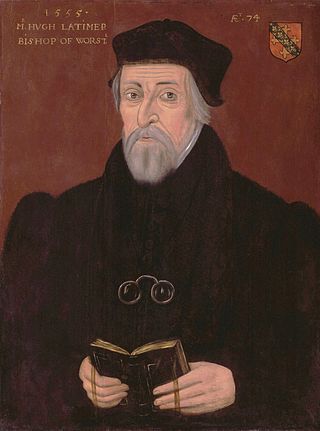Related Research Articles

Hugh Latimer was a Fellow of Clare College, Cambridge, and Bishop of Worcester during the Reformation, and later Church of England chaplain to King Edward VI. In 1555 under the Catholic Queen Mary I he was burned at the stake, becoming one of the three Oxford Martyrs of Anglicanism.

Charles Richard Sumner was a Church of England bishop.
John Scory was an English Dominican friar who later became a bishop in the Church of England.

John Bradford (1510–1555) was an English Reformer, prebendary of St. Paul's, and martyr. He was imprisoned in the Tower of London for alleged crimes against Queen Mary I. He was burned at the stake on 1 July 1555.
William Bishop was the first Roman Catholic bishop in England after the Reformation, serving as Vicar Apostolic of England and titular Bishop of Chalcedon.
William Henry Ridley was a priest in the Church of England and an author.

Thomas Bickley (1518–1596) was an English churchman, a Marian exile who became Warden of Merton College, Oxford and Bishop of Chichester
Augustine Lindsell was an English classical scholar and Bishop of Hereford. In church matters he was advanced by Richard Neile, and was a firm supporter of William Laud. As a scholar he influenced Thomas Farnaby.
William Barlow or Barlowe was a Welsh churchman and scientist.

John Young (1514–1580) was an English Catholic clergyman and academic. He was Master of Pembroke Hall, Cambridge, and was later imprisoned by Elizabeth I. He is not John Young (1534?–1605), Master of Pembroke Hall later in the century, and afterwards Bishop of Rochester.
David Pole was an English Roman Catholic churchman and jurist; he was Bishop of Peterborough from 1557 until deprived by Queen Elizabeth I.
William Chedsey (1510?–1574?) was an English Roman Catholic priest and academic, who became archdeacon of Middlesex in 1556 and President of Corpus Christi College, Oxford in 1558.
John Véron was a French Protestant controversialist and preacher, known for his activities in England. Véron also served as an English translator for the British Privy Council.
William Hyde (1597–1651) was an English Roman Catholic convert and priest, presumed to be of Dutch or Flemish background, who became President of the English College, Douai.

Lewis Atterbury the younger LL.D., (1656–1731) was an English churchman, a royal chaplain to two monarchs.
Thomas Brice (1536–1571) was a Church of England clergyman, martyrologist and poet in the later 16th century.
Thomas Palfreyman was an English author and musician.
Edward Crome was an English reformer and courtier.
John Gregory, a.k.a. John Gregorie, was an English orientalist.

Joyce Lewis or Jocasta Lewis was an English Protestant martyr.
References
- 1 2 . Dictionary of National Biography . London: Smith, Elder & Co. 1885–1900.